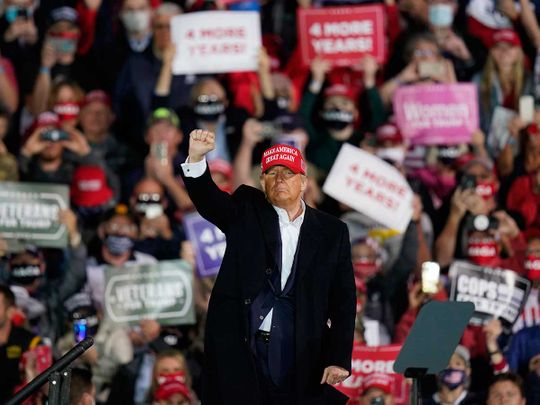
Dubai: Religion, traditionally an alien subject in American elections, is poised to play what could be a significant role in next month’s presidential polls.
The United States constitution was carefully drafted to emphasise the separation of state and religion. In public life, US institutions go to great lengths to project secular tendencies, in schools, workplace and ultimately the White House.
In 1802, Thomas Jefferson, one of the leading founding fathers of the republic and the lead author of the Declaration of Independence in 1776, wrote that the US constitution was written in a way that aimed at “building a wall of separation between Church and State.” The concept had been enshrined in the First Amendment, adopted in 1791, which prohibits the federal government from any involvement in religion. Building on that principle, the US Supreme Court in 1962, in the case of Engel v. Vitale, declared that prayer in public schools violated the constitution.
Religion in public life
However, in recent years and as the Supreme Court moved to the right with President Donald Trump’s appointment of conservative justices, the court seems to increasingly tolerate the involvement of religion in public life. In June this year, the court issued a landmark decision that basically allowed private religious schools access to federal education funds.
While the majority of analysts said it was a blow to the constitutional principle of the separation of church and state, the decision was seen as a major victory for Education Secretary Betsy DeVos and the Trump administration, which advocates boosting public funding of religious institutions.
The move was one of many the Trump White House advocated strongly to appease White Christian Americans, especially the Evangelical population, who form the main base of the president’s support. During the Black Lives Matter protests outside the White House in early June, Trump made it a point to walk outside his residence threatening a military action to stop the protests while holding a Bible in front of the nearby St John’s Episcopal Church.
Although it was not very clear who posing with a Bible outside a church symbolised at a time when thousands protested in most major cities in the country against alleged police brutality and institutional racism against African Americans, the more religiously conservative Americans celebrated it as another evidence of Trump’s advocacy of religious values.
Latest polls
The latest polls seem to echo that sentiment. Joe Biden may have a solid national lead in the polls over the president - between 8 to 12 points in most opinion polls, but when it comes to the more religiously conservative White population, the numbers tell a different story. According to the latest poll by the respected, non-partisan Pew Research Centre, released on October 13, Trump enjoys the support of 78 percent of the White evangelical Protestants, compared to 17 percent for Biden.
Among the White Protestants, but not evangelical, Trump’s support is at 53 percent while Biden at 43. Among White Catholics, Trump enjoys the support of 52 percent compared to 44 for Biden. Meanwhile, when it comes to Whites who declared no religious affiliation, Biden’s support surges to 62 percent while Trump declines to 31.
While Biden is projected to win by most pundits, Trump is not out yet. Nobody is actually willing to rule out a comeback by the president. He did exactly that in 2016, where he was trailing Hillary Clinton in the polls during the entire campaign. And if Trump is able to stage an unlikely comeback on election night, it will surely be because of the historic support he enjoys among White conservative Americans, especially those with religious affiliation.








